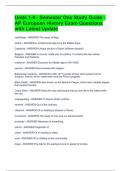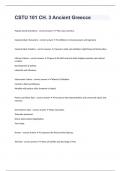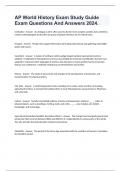Classical greece - Study guides, Class notes & Summaries
Looking for the best study guides, study notes and summaries about Classical greece? On this page you'll find 506 study documents about Classical greece.
Page 4 out of 506 results
Sort by

-
Units 1-6 - Semester One Study Guide - AP European History Exam Questions with Latest Update
- Exam (elaborations) • 30 pages • 2024
- Available in package deal
-
- $18.49
- + learn more
vexillology - ANSWER-The study of flags. Gothic - ANSWER-A architectural style from the Middle Ages. Catalonia - ANSWER-Unique section of Spain (different people). Belgium - ANSWER-A country made only for politics. It contains the two halves Flanders and Wallonia. medieval - ANSWER-Synonym for Middle Ages (476-1400). secular - ANSWER-Non-involved with religion. Babylonian Captivity - ANSWER-() period of time when popes lived in Avignon, France; which made them look like French ...

-
MUSIC 2MT3 - Exam Review|A+ Graded
- Exam (elaborations) • 9 pages • 2024
-
- $10.99
- + learn more
MUSIC 2MT3 - Exam Review|A+ Graded Preliterate Cultures - before reading existed - used complex languages, but no symbol system for reading - thought of music as a supernatural force that affected mental and physical wellbeing - music and medicine were almost interchangeable in these cultures - medicine men = healing rituals to appease gods Ancient Egypt - priest/physicians referred to music as medicine for the soul, often included chants as part of medical practice Ancient Greec...

-
CSTU 101 CH. 3 Ancient Greece verified already passed
- Exam (elaborations) • 6 pages • 2024
- Available in package deal
-
- $12.99
- + learn more
CSTU 101 CH. 3 Ancient Greece Popular Greek inventions - correct answer The crane and dice. Classical Ideal: Humanism - correct answer Confidence in human power and ingenuity. Classical Ideal: Fatalism - correct answer Humans' pride and ambition might bring self destruction. Minoan Culture - correct answer Figure of the Bull central in both religious practice and cultural creation. Development of pottery. Labyrinth and Minotaur. Mycenaean Culture - correct answer Warrior Civiliz...

-
Fires of Change- Cremation Questions & 100% Correct Answers- Latest Test | Graded A+ | PassedFires of Change- Cremation Questions & 100% Correct Answers- Latest Test | Graded A+ | Passed
- Exam (elaborations) • 32 pages • 2024
- Available in package deal
-
- $12.49
- + learn more
What cultures is recognized as having significant influence on the evolution fo the funeral service industry? -:- Ancient Greeks When did cremation as a means of disposition begin? -:- around 1000 B.C. The practice of fire burial increased in attractiveness during? -:- Homeric and classical times in Greece (approx. 750 B.C. - 350 B.C.) In Ancient Greece, upon death of the deceased -:- The eyes and mouth were closed and the body was washed and dressed for a time of lying in state p...

-
History Exam Study Guide (Based of the Study Guide in Schoology) With Complete Verified Solution 100%
- Exam (elaborations) • 7 pages • 2023
-
- $11.49
- + learn more
History Exam Study Guide (Based of the Study Guide in Schoology) With Complete Verified Solution 100% What does Renaissance mean? The term "Renaissance" refers to a period in European history marked by a revival of interest in the arts, literature, and learning, spanning roughly from the 14th to the 17th century. Why was there a need for rebirth in Europe during the Renaissance? The Renaissance was spurred by factors such as the aftermath of the Plague and War, which led to a desire for ...

-
PRAXIS II ENGLISH CONTENT KNOWLEDGE: AUTHORS AND THEIR WORKS WITH COMPLETE SOLUTIONS 100%
- Exam (elaborations) • 6 pages • 2024
-
- $10.69
- + learn more
PRAXIS II ENGLISH CONTENT KNOWLEDGE: AUTHORS AND THEIR WORKS WITH COMPLETE SOLUTIONS 100% Homer Homeric or Heroic Period. The greatest of the ancient Greek epic poets and author of the Iliad and the Odyssey, works that lie at the beginning of the Western literary canon. Gorgias Greek sophist from Sicily who turned his back on true philosophy; believed that all statements were false and that everything was incomprehensible and unknowable Aesop Greek author of fables Plato Clas...

-
CSTU 101 - Exam 1 (Liberty U)questions with answers
- Exam (elaborations) • 5 pages • 2024
- Available in package deal
-
- $13.49
- + learn more
CSTU 101 - Exam 1 (Liberty U)Culture - correct answer What we make of the world Western culture - correct answer A set of shared culture generally in Europe and related areas Humanities - correct answer What makes us human Epic - correct answer A long narrative recounting heroism, centered on the hero with a sense of national identity Golden Age of Athens (Greece) - correct answer • Persian Wars - Destruction of Athens by the Persians, followed eventually by Greek victory • Pe...

-
AP World History Exam Study Guide Exam Questions And Answers 2024.
- Exam (elaborations) • 19 pages • 2024
-
- $7.99
- + learn more
Civilization - Answer An ambiguous term often used to denote more complex societies but sometimes used by anthropologists to describe any group of people sharing a set of cultural traits. Foragers - Answer People who support themselves by hunting wild animals and gathering wild edible plants and insects. Cuneiform - Answer A system of writing in which wedge-shaped symbols represented words or syllables. It originated in Mesopotamia and was used initially for Sumerian and Akkadian but...

-
Level 10 RCM History: Classical| Exam Questions with Verified Answers |Post Finals 2025
- Exam (elaborations) • 12 pages • 2024
-
- $9.99
- + learn more
Level 10 RCM History: Classical| Exam Questions with Verified Answers |Post Finals 2025 Classicism, Sonata Cycle, Strung, Drang, Viennese, Exposition, Coda Classicism - refers to the cultures of ancient Rome and Greece as well as the art, architecture, and music of the late 18th century - adheres to principles of symmetry, balance, and proportion - emphasis on excellence, enduring value, and timeless quality Sonata Cycle -a multi-movement structure -emerged in the Classical era -occ...

-
Praxis 5004 - World History and Economics (2023/2024) Already Passed
- Exam (elaborations) • 22 pages • 2023
- Available in package deal
-
- $9.99
- + learn more
Praxis 5004 - World History and Economics (2023/2024) Already Passed Paleolithic and Neolithic Periods Hunter-gatherer and agricultural revolution Mesopotamia (c. 3500-c. 2350 BCE) Formed at the Tigris and Euphrates Rivers - Invented writing, military expertise, city-states, Code of Hammurabi. Sumer constructed dikes and reservoirs. Invention of writing in 3500 BCE marks the beginning of civilization. Iraq Shatt Al - Arab - largest Date Palm forest Ancient Egypt (c. 2711-c. 1090 BCE) Influence...

How much did you already spend on Stuvia? Imagine there are plenty more of you out there paying for study notes, but this time YOU are the seller. Ka-ching! Discover all about earning on Stuvia


